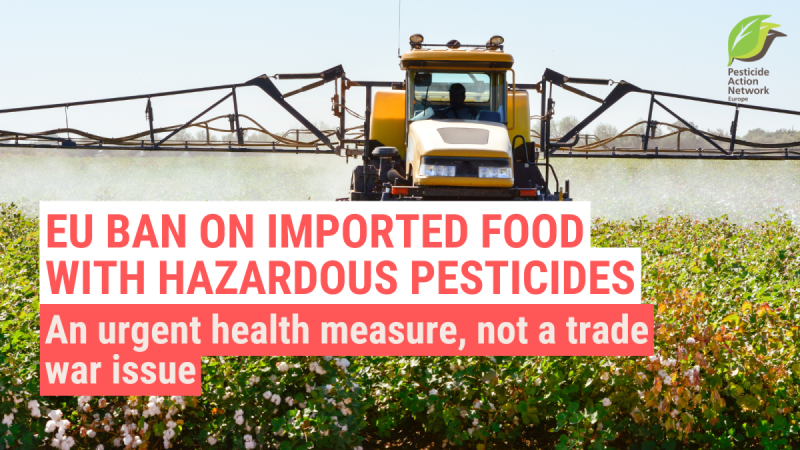Stopping the import of US products with residues of pesticides no longer approved in Europe is not an ingredient of a trade war. The EU simply has a legal obligation to keep hazardous pesticides out of the food supply in order to protect European consumers’ health, especially pregnant women and children.
The Financial Times recently called it a ‘Trump style import ban.’ [1] That is not correct. This is a measure to protect health. For years, the European Commission has been committed, through EU law and international agreements, to restrict food imports containing pesticides banned in the EU. When a substance is classified as dangerous to our health, residues in food should be reduced to the lowest possible level, whether these are grown in the EU or abroad. However, this is not always the case - due to loopholes in the European law and ultimately the prioritization of commercial trade interests over public health. Currently, 65 EU-banned pesticides still exceed the minimum allowable level in certain food products, including substances highly hazardous to human health, as we recently informed the Agriculture Commissioner in a letter. [2]
Although it should not be the case, we find very dangerous pesticides on our plates and beverages. In our study Double Risk, Double Standards, we detected 69 EU-banned hazardous pesticides in food sold in the EU, with 53 exceeding the EU’s maximum residue levels. [3]
As a result, European consumers unknowingly ingest these hazardous pesticides, potentially putting their health at risk—especially pregnant women, infants, and children. Harmful substances such as carbendazim, a fungicide classified as mutagenic, as well as linuron and propiconazole, toxic to reproduction, continue to be detected in plant-based foods sold across Europe. Neurotoxic substances that are lethal to bees, including thiamethoxam, clothianidin, and imidacloprid, also appear in the food supply. These chemicals are often found in harmful "pesticide cocktails," and in some cases, their combined presence even exceeds the legal residue limits set for individual pesticides.
EU needs to act
The detection of residues from EU-banned pesticides in our food is deeply concerning. It’s time for the EU to take decisive action and ban all substances hazardous to our health.
The EU must also stop producing dangerous pesticides for export to third countries, only to have them back through the import of toxic products. This not only puts European farmers at a disadvantage, but also harms the environment and health of workers in third countries.
In summary, it is urgent to protect human health and the environment above commercial interests and trade wars that only focus on economic gains.
Notes:
[1] EU plans Donald Trump-style import ban on food (Financial Times)
[2] Letter to Commissioner Hanser on Food double standards
[3] Report: Double Standards, Double Risk: Banned Pesticides in Europe’s Food Supply
Read more
